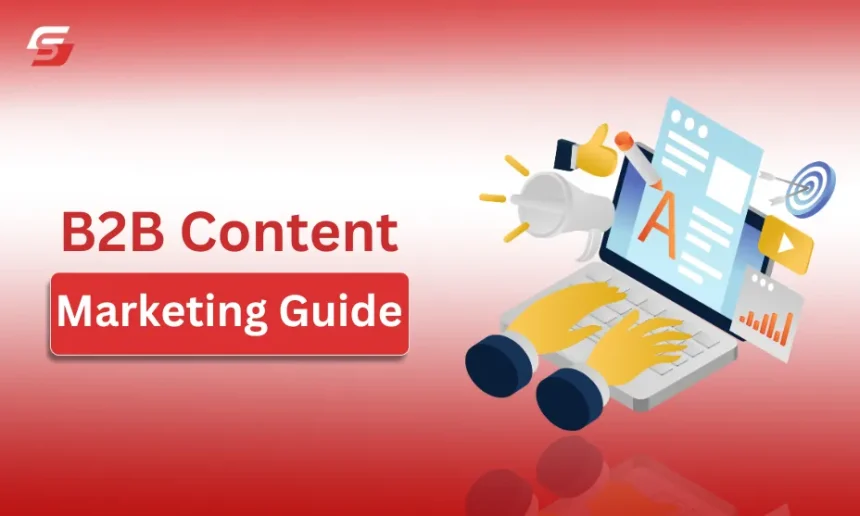B2B (business-to-business) content marketing is extremely important in this current digital era, where the information is easily accessible through clicks, this effective marketing technique has completely changed how companies interact with one another and provides a special path to long-term success, relationship-building, and trust-building.
I will dissect B2B content marketing into its essential elements in this extensive article, giving you useful tips and tactics to boost your B2B marketing initiatives.
What is B2B Content Marketing
B2B content marketing involves the creation and distribution of valuable, informative, and engaging content with the aim of connecting with other businesses. Unlike traditional marketing, which focuses on direct product or service promotion. B2B content marketing centers around solving problems and providing solutions to other businesses. It’s all about being a helpful resource rather than a sales pitch.

Important B2B Content Marketing Statistics
Check out these impressive B2B content marketing statistics to consider:
- Companies with blogs generate an average of 67% more leads monthly than companies that don’t have active blogs (DemandMetric).
- 29% of marketers actively use content marketing to drive better outcomes (HubSpot).
- 50% of marketers increased their investment in content marketing in 2024 (HubSpot).
Why It Matters
Why is B2B content marketing is a game-changer? Let’s take a closer look at its significance:
- When you consistently provide valuable content, you become a trusted resource in your industry. Your audience begins to view you as an expert, which is vital in B2B relationships.
- High-quality content not only attracts potential customers
- Well-optimized content is a magnet for organic traffic. When your content ranks well in search engines, you attract users actively seeking information in your niche.
- Being a thought leader in your industry gives your brand a competitive edge. B2B content marketing is a path to achieving that position.
- By consistently delivering value, you nurture long-lasting relationships with other businesses, which can lead to ongoing partnerships and collaborations.
Crafting Your B2B Content Marketing Strategy
In the under section, we have mentioned the B2B content marketing strategies:
Identifying Your Target Audience

Understanding your target audience is the foundational step in your B2B content marketing journey. It’s essential to know:
- Who Are Your Ideal Customers? Define your ideal B2B clients. What industries do they belong to? What are their specific needs and challenges?
- What Challenges Do They Face? Identify the problems and pain points your audience encounters in their day-to-day operations.
- What Are Their Needs? Determine what solutions they are actively searching for and how you can provide them.
Setting Clear Objectives
Setting clear objectives is vital to gauge your content marketing success. Your objectives could include:
- If lead generation is a priority, focus on creating content that encourages your audience to act.
- To boost brand awareness, create content that educates and informs while subtly promoting your brand.
- To drive traffic, prioritize content that is optimized for search engines and shareable on social media.
- For nurturing relationships, develop content that serves the needs of your current clients.
Keyword Research Simplified
Keyword research is a cornerstone of effective content marketing. It aids in your comprehension of how your target audience looks for information. You can uncover appropriate keywords with the help of tools like Google Keyword Planner, but keep in mind that content alignment with audience search intent is more important than just filling your content with keywords.
Crafting Quality Content
Quality content is the lifeblood of B2B content marketing. Your content should be:

- It should provide meaningful insights and solutions for your audience.
- Always base your content on accurate and up-to-date information.
- Use plain language and incorporate visuals to make your content more engaging.
- Always keep your audience’s needs at the forefront when creating content.
Content Formats
Diversifying your content formats ensures that you can engage your audience effectively. Consider the following content formats:
- Blog Posts: These are the backbone of your content marketing strategy, providing in-depth information and insights.
- Infographics: Visual content can simplify complex information and make it more digestible.
- Videos: Video content has gained tremendous popularity and can be a powerful tool to convey your message.
- eBooks: These long-form content pieces can showcase your expertise comprehensively.
- Whitepapers: Whitepapers demonstrate in-depth knowledge and research, positioning your brand as a thought leader.
- Case Studies: Sharing success stories demonstrates how your solutions have helped other businesses.
Content Distribution
Creating excellent content is only part of the equation. A well-considered distribution strategy is key. Leverage various platforms and channels, including:
- Make your website the central hub of your content marketing efforts.
- Share your content on platforms where your audience is active.
- Regularly update your subscribers with valuable content.
- Collaborate with industry-related sites to reach a broader audience.
Consistency Is Key
Consistency is a fundamental aspect of content marketing. Create a content calendar to keep your publishing schedule organized. Regularly scheduled content keeps your audience engaged and returning for more.
Promoting Your Content
Publishing content is not enough. Promotion is essential to expand your content’s reach. Strategies include:
- Share your content on your social media platforms to reach your followers and their networks.
- Utilize email newsletters to distribute your content to a dedicated audience.
- Collaborate with influencers in your niche to leverage their audience and expertise.
Key Metrics Simplified
Measuring your B2B content marketing success involves tracking key metrics:
- Monitor the number of visitors to your website.
- Track the leads generated through your content.
- Observe the number of times your content is shared on social media.
- Measure how many visitors take a desired action (e.g., filling out a contact form).
- Evaluate how your content affects customer engagement and interaction.
Tools for Tracking
To measure and track your content marketing performance numerous tools are existing to help you:
- Google Analytics: This is a free, comprehensive tool that provides insights into your website’s traffic and user behavior.
- HubSpot: A popular inbound marketing platform with analytics features.
- Moz: A suite of SEO tools that can help you analyze and optimize your content for search engines.
B2B Content Marketing Challenges
In the under section, we have mentioned the challenges of B2B content marketing.
Overcoming Writer’s Block
Writer’s block can be a common challenge in content marketing. Here are strategies to overcome it:
- Take old content and give it a fresh twist or repurpose it into a new format.
- Interview experts in your industry or clients and transform these conversations into compelling content.
- Real-life success stories can make for engaging content.
- Stay updated with industry trends and share your insights on the latest developments.
Standing Out in a Crowded Space
In an internet filled with content, standing out is a challenge. To differentiate yourself:
- Find Your Unique Angle: Identify what sets you apart and make your content’s focal point.
- Tell Your Brand Story: Authentic storytelling is a powerful tool to connect with your audience and showcase your values.
Adapting to Changes
The digital landscape is continually evolving. To stay relevant, you must:
- Keep a keen eye on trends in your niche and adapt your strategy accordingly.
- Don’t hesitate to pivot your content strategy when necessary to align with shifts in your industry.
Best B2B Content Marketing Examples
Here are some of the best B2B content marketing examples that have set the bar high and inspired many in the industry.
Grammarly – Content Hub
Grammarly’s blog and content hub provides valuable tips and insights on writing, grammar, and communication. Their content is designed to help professionals improve their writing skills and communicate more effectively. Grammarly’s content marketing strategy has helped it build a loyal audience and establish its brand as a leader in the writing and communication space.
HubSpot – Inbound Marketing Blog
HubSpot’s Inbound Marketing Blog is a home of valuable content for marketers. The blog covers a wide range of topics, from SEO and social media to email marketing and sales. HubSpot’s content is not only informative but also engaging and easy to understand. Their blog has become a go-to resource for marketers looking to stay updated on the latest trends and best practices.
The Moz Blog
Moz’s blog is an ideal resource for SEO professionals. The blog covers a wide range of SEO topics, from keyword research and link building to technical SEO and content marketing. Moz’s commitment to providing high-quality and in-depth content has helped them build a loyal following and establish their brand as a leader in the SEO space.
B2B Content Marketing Best Practices
In the under section, we have mentioned the best marketing practices:
Educate, Don’t Sell
Keep in mind that the goal of B2B content marketing is education rather than sales. Help your audience solve their issues by sharing problem solving and informative content.
Storytelling
Effective storytelling can set you apart from your competitors. Share your brand’s journey, challenges, and successes. Authentic storytelling builds trust and relatability.
User Experience Matters
A user-friendly website is essential for a B2B content marketing plan to be successful. Verify that the content is readable and available on mobile devices.
Strong Call-to-Actions (CTAs)
There needs to be an obvious call to action in every piece of content. Tell your readers what to do next, such contacting your sales team, downloading an eBook, or subscribing to a newsletter.
Patience and Persistence
B2B content marketing is a long-term game. It takes time to see significant results. Stay patient and persistent in your efforts, and your dedication will pay off.
Conclusion
B2B content marketing doesn’t need to be intimidating or complex. You can engage your audience, achieve your business goals and build trust by creating quality content promoting it effectively, understanding your audience and measuring success. If you keep picking up new skills, making adjustments, and sharing your own narrative, you should have no trouble succeeding with content marketing in the B2B space.
Recall that the key is to add value and create enduring connections. In a world where information is abundant, your content can be the beacon that guides businesses to your solutions.


